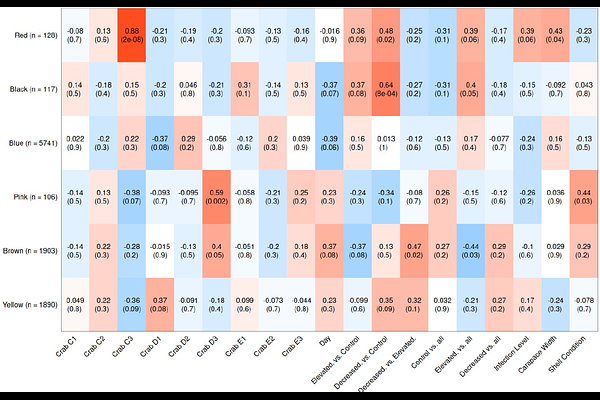Uncovering Host-Parasite Dynamics: Gene Expression Shifts in Hematodinium-infected Chionoecetes bairdi in Response to Temperature ChangeChanges in gene expression under differing temperature regimes of infected Chionoecetes bairdi and the parasitic dinoflagellate Hematodinium sp.

Uncovering Host-Parasite Dynamics: Gene Expression Shifts in Hematodinium-infected Chionoecetes bairdi in Response to Temperature ChangeChanges in gene expression under differing temperature regimes of infected Chionoecetes bairdi and the parasitic dinoflagellate Hematodinium sp.
Coyle, A. E.; White, S. J.; Crandall, G.; Jensen, P. C.; Roberts, S.
AbstractParasites can have profound effects on their hosts, and those effects can be altered by changing environmental conditions. The dinoflagellate Hematodinium sp. is a common and deadly parasite of the crab Chionoecetes bairdi, a species vulnerable to rising ocean temperatures. To examine the impact of parasitism under various temperature conditions, infected crabs (n = 9) were held under three temperature regimes (4{degrees}C, 7.5{degrees}C, and 10{degrees}C) for 17 days. RNAseq was performed on samples from three timepoints, and the relationships of temperature and time to gene expression were examined. Transcriptomes for C. bairdi and Alveolata symbiotes were created, and genes linked to immune function were identified within both host and parasite. Within the host, 1721 contigs were differentially expressed in response to a temperature increase, with 86% of these increased in expression. In total, 3013 contigs linked to temperature response were identified. Additionally, numerous changes in biological processes were observed in Hematodinium over the course of the experiment, including development and microtubule-based processes and ribosomal assembly. Through understanding the impact of changes in temperature on gene expression within both Hematodinium and infected C. bairdi, we provide a more complete picture of the response of these species to rising ocean temperatures.